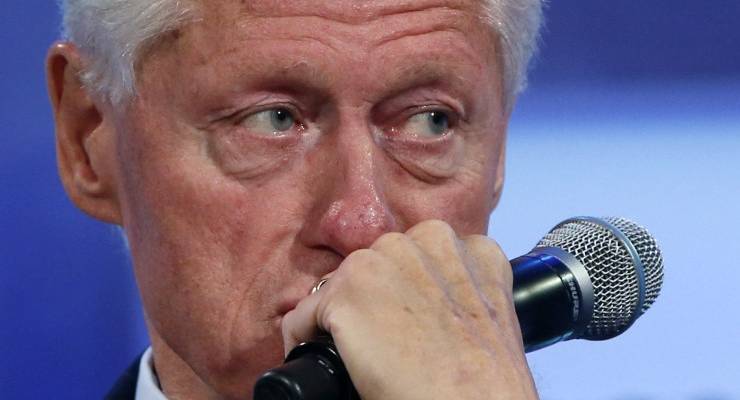
The 1990s were just an epoch-making decade in which the seeds for what we now see and experience were sown. Two pivotal dates, the anniversaries of which were at the weekend, stand out.
First, the inauguration of William Jefferson Clinton as the 42nd president of the United States, 30 years ago. Second, the revelation through an internet scandal sheet, the Drudge Report, of his affair with White House intern Monica Lewinsky, five years later to the day.
Clinton was a change-making politician who commanded attention and left the crowd wanting more. His legacy can be measured in myriad ways — he changed his party, the Democrats, the country and much of the international agenda. His failures were often as great in magnitude as his achievements. But his slate remains more positive than negative and, as with many political practitioners, he’s being reassessed for the better, even by old foes.
Clinton won office after a time as a slightly tarnished and then little known governor from the southern state of Arkansas, the self-styled comeback kid who pushed aside more formidable candidates in the 1992 primaries — including California governor Jerry Brown, and senators Paul Tsongas, Tom Harkin and Bob Kerrey.
Clinton, with his equally youthful running mate Al Gore, campaigned on a platform of generational change that was aimed at sweeping aside the politics of the Ronald Reagan and first George Bush era.
He remade the party by planting a flag in the centre through the Democratic Leadership Council, a body formed in the mid-1980s, focused on winning back the middle white and Black voters who had moved and become known as “Reagan Democrats”.
Clinton became chairman of the council in 1990 and issued a New Orleans Declaration which gave priority to opportunity, responsibility and community.
After he left the presidency, Clinton reflected on the importance of the declaration, saying it was central to building what became known as the Third Way in modern politics. In 2000 he summed up the party’s fundamental mission as: “To expand opportunity, not government; that economic growth is a prerequisite for expanding opportunity for everyone; and that the way to build America’s economic security is to invest in the skills and ingenuity of our people and to expand trade, not restrict it.”
This is a succinct outline of the mission of centre-left parties in the 1990s, and remains relevant. The headline for the key shift came in Clinton’s 1996 State of the Union address to Congress when he declared “the era of big government is over”. Conservatives and many progressives saw this as an admission of defeat. Once more, they underestimated Clinton. After all, the era of big government wasn’t over and it still isn’t.
Clinton set about “triangulating” his way out of the political and policy quagmire he found himself in at the beginning of his second term. He managed to do it, despite the slings and arrows, many of which were self-inflicted.
These days two of the legs of Clinton’s policy stool have broken off. Big government is back, thanks in large part to the pandemic and its spending agenda which is hard to shake, and free trade has been reshaped into a narrower policy of “friend shoring” and a kind of creative protectionism. Industry policy is definitely in vogue these days.
Perhaps one of the key things in Clinton’s legacy is something acknowledged but seldom adopted by his successors: his best on ground communication skills.
Daniel Stid, a former Republican operative from the 1990s, writing in The Liberal Patriot this past week, summed it up: “Clinton had a knack for talking about even complex points of policy and weaving them together with down-home political asides in ways that left normal Americans nodding along in agreement with him.”
Stid said this was Clinton’s mind but that it ultimately rested on the conviction he was speaking to fellow Americans who he needed to “talk with rather than down to, about or at”. Modern politicians could have these paragraphs transcribed and put on their office notice boards as a reminder of how it’s done.
Stid complimented the most successful Democratic politician of the modern era for his eight years of sustained economic growth and approval rating of 66% by the time he left office — “the highest rating for any departing president since Gallup began tracking 70 years ago.”
Of course, the Clinton years were stained by the Lewinsky scandal.
An affair with a White House intern — seen as a matter of lying and not so much a gross abuse of power in a workplace relationship that couldn’t be more imbalanced — was weaponised by the Republicans who used a special counsel to air the private life of a president as it had never been done before.
A sense of unfairness among many Americans meant it backfired as a political issue on the Republicans (a sharp warning perhaps as the hyper-partisan Congress in power today works up to digging into the dark recesses of President Joe Biden’s family).
While Clinton again won the nightly news, the unseemly affair broke down a barrier that had been immutable, especially when the philandering John F Kennedy was president.
Lewinsky describes herself now as “Patient Zero” of internet shaming — and she was. Drudge was a prototype of every unsavoury back alley of the internet — still in its infancy in the 1990s — and presaged the era of Donald Trump. Many people believe that without a Clinton-Lewinsky scandal there would have been no Trump.
Who knows? But just as the politics and policy of William Jefferson Clinton marked a profound change in American politics, his most serious failing ushered in a hyper-partisan, criminalisation of politics played with weapons of brute rhetorical force.
Some fear the worst is yet to come.








No doubt that Clinton was an extraordinary talented politician and communicator, but his legacy was disastrous. Not so much because of the Lewinsky scandal, tacky though that was, but because his economic policies poured petrol on the flames of neo-liberal deregulation and helped set the US up for the 2008 financial crisis. Clinton’s economic team exacerbated inequality, looking after their Wall Street cronies while leaving the blue-collar workforce behind, and implementing harsher social welfare cuts than Reagan. Sadly, Obama learned nothing from this, and hired the same gang as his economic team. That’s why so many white blue-collar voters who had been taken for granted and dudded by successive Democrat administrations went feral and voted for Trump.
That’s true, and there is also Clinton’s legacy of mass incarceration (the 1994 Violent Crime Control Act and the 1996 Antiterrorism and Effective Death Penalty Act) which vastly increased the number of prisoners, mainly from ethnic minorities. “When he won his first presidential election in 1992 there were 847,000 people in prison. By the time he ended his second term in 2000 that population had grown to 1,334,000.” And it carried on growing. Even Clinton later admitted it was a disaster.
Suggesting that the Lewinsky scandal is Clinton’s worst failing is simply bizarre.
That suggestion is obviously pushing a revisionist barrow; hey, look over there, away from the neoliberalism.
The Lewinsky scandal was small beer next to the damage wrought by thoroughly betraying the working class.
You could probably write a lot more words about how Trump owed his rise to NAFTA, since all the pundits figured he tapped into working class dissatisfaction.
But if you’re looking for the true culprit to pin Trump on, it was obviously, obviously, white supremacism, and by the way, that whole concept was invented merely to further the dominance of an economic elite.
Meanwhile, trickle-down lies are STILL being peddled, after the neoliberal con has been well and truly pulled, with Clinton widely recognised as one of its chief architects.
I would say that Newt Gingrich played a much larger part in ushering “in an ugly era of US politics.” It was the Republicans, after all, who turned a minor issue into a major political furore.
That’s it – the premise of this article is thoroughly nullified by merely invoking the name Newt Gingrich.
And if you want to go looking for Clinton’s legacy, it’s replacing representation of the left with a neoliberal boot on your throat.
Jimmy Carter he ain’t.
But Gingrich was a creature of the GOP (along with McConnell and the rest opf that ghastly crew), Mudroch’s party – that Rupert’s FUX News runs their PR business – and Atkins worked for Mudroch, selling those sort of politics….
If I were to look at Clinton’s ‘failings’ I would also be looking at his dealing with big business. The original definition of ‘fascism’ still applies and it can be argued that the Clinton administration put in place deals that contributed to the GFC but then the history of the GFC has been rewritten anyway.
The gaslighters have no shame.
Three observations;
The Republicans obsession with Bill and Hilary is fascinating. Even more fascinating were the efforts of hard right Libs to somehow drag them into discussions about Labor during our recent federal election. I really can’t understand why we’re talking about Bill today. There’s so much more that is important and/or interesting than his time in office.
That brings me to Newt. Frontline (PBS) interviewed Newt’s spin man for it’s program Lies, Politics and Democracy. The interview went for about an hour, and by the end of it, Newt’s man was in tears about the path he and Newt took and where it had led US democracy today (insurrection, QAnon people in the House, etc).
For everyone dismissing or minimising Monica’s sexual harrassment by Bill, it had an incredibly negative impact on her life and it took her a long time to recover. A mature aged boss should NOT be manipulating an employee in her early twenties. Not ever. It doesn’t matter who he is or how charismatic people find him, nor how besotted she is.
On the topic of Newt, this essay on Conservatism also highlights how much damage he has wrought.
https://pages.gseis.ucla.edu/faculty/agre/conservatism.html
The negative impact on Lewinski’s life has to also include the way she was mercilessly used and manipulated by Clinton’s opponents with no regard at all for her wishes.